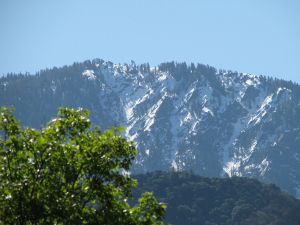Kate Rauner's Blog, page 73
April 27, 2016
You like me – you really like me!
 I just received a message from WordPress that this blog’s received 1,000 likes. Thanks to all my friends, followers, and visitors. You guys keep me going. Please, download a free book of my scifi or poetry as my thank you and keep me writing – post an honest review (on Amazon if possible)
I just received a message from WordPress that this blog’s received 1,000 likes. Thanks to all my friends, followers, and visitors. You guys keep me going. Please, download a free book of my scifi or poetry as my thank you and keep me writing – post an honest review (on Amazon if possible)
Filed under: Kate's Books, Neat Science News, Poetry, Science Fiction Tagged: bestscifi, hardscifi, poem, poetry, SciFi, thankyou








Spring Melt #Haiku #poem #poetry #spring
Spring time melts the snow
Icy threads weave through dark pine
Braiding white with black
By Kate Rauner
My recent trip through National Parks in the American Southwest has inspired several haiku. This poem and image are from Sequoia.
Filed under: Poetry Tagged: dark green pines, haiku, poem, poetry, snow melt, spring








April 23, 2016
Mars Inspiration on Earth #NationalPark #nature #travel #usa #scifi #amwritingscifi
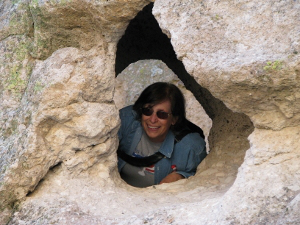
That’s me
I just returned from a week traveling to National Park sites across the American southwest. There are amazing public lands for hiking and camping – and it’s a great way to celebrate the 100th anniversary of the National Parks.
I was especially inspired by the Mojave Preserve’s huge cliffs of tuff – volcanic ash compressed into rock. The way it weathers is awesome.
The pale pocked cliffs make me think about Mars – in particular, the colony in my On Mars series. Colonists live in habitats of stone, 3-D printed from sand and meters thick to shield them from cosmic radiation inside a bubble of earthly environment.
Maybe it’s time for a habitat to be carved into the actual rock of Mars. I think I’ll do that in the third book in my series:
Misfits from the Martian colony live in the Tartarus Mountains of
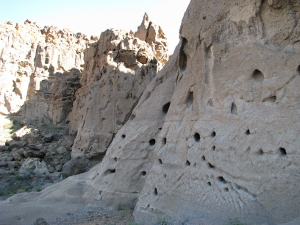
Volcanic tuff – on Earth? or Mars?
Elysium, in a cavern dug by a legendary Hermit. The Hermit has always provided life support, but something’s gone wrong, and it’s up to a roboticist in the midst of a mid-life crisis to save the day (sol as they say on Mars.)
I don’t know if the eastern Elysium Plain is buried under hundreds of meters of tuff – maybe someday (some sol) we’ll find out. Until then, subscribe to my occasional emails to track my writing progress and receive special offers and a piece of flash fiction, too.

Scifi colonists may not survive on the real planet Mars
Travel with my colonists, and find out if their fellow humans are a bigger danger than the hostile planet.
The On Mars series is available from Amazon and all the major online retailers. Visit your favorite site or check here.
Filed under: Kate's Books, Neat Science News, Science Fiction Tagged: camping in Arizona, first colony on Mars, mars, Mojave Preserve, National Parks Anniversary, Tartarus Mountain of Elysium, volcanic ash tuff








April 20, 2016
Cliff Dwelling #haiku #poem #poetry #NewMexicoTrue
Ancient eyes have watched
Hands long gone build up stone walls
Where children once laughed.
By Kate Rauner
I’ve been traveling National Park sites in the American Southwest – which inspires haiku. It’s the national park system’s 100th anniversary, but anytime is a good time to visit.
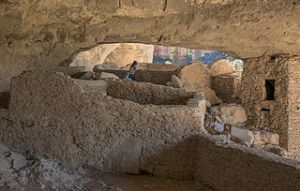
Gila Cliff Dwellings
Filed under: Poetry Tagged: archaeology, Cliff Dweller Canyon, Gila River, Glia cliff dwelling, haiku, Mogollon, Native Americans, US National Monument








April 16, 2016
True North – whatever that means #science #space #climate #northpole

Wandering magnetic North Pole
To find the North Pole, you travel north, right?
It depends on which North Pole you’re after.
Earth turns around an axis like a giant spinning top. The places where that invisible axis intersects with the planet’s surface are the north and south rotational poles. Due to Earth’s wobble on its axis, these spots drift in roughly decade-long cycles… [and are] completely separate [from] the planet’s magnetic poles, which also reverse periodically over the course of millions of years… the geographic north and south poles [are] the long-term averages of those rotational positions.
Now, as global warming melts ice and pumping drains aquifers, Earth’s distribution of mass is changing—and so are the rotational poles. Earth’s northern pole is drifting rapidly eastward.
Well, “rapidly” in geologic terms.
The change isn’t fast enough for the average person to notice – you don’t need to replace your maps and globes today – though you could write a poem about it. For science, understanding what’s happening could lead to “more accurate predictions of changes in climate in the future.”
It all reminds me of the old joke-question asking if all the people in China jumped at the same time, could they change the Earth’s spin? Instead the joke should be, if all the people in China (and everywhere else) burn fossil fuels at the same time, can they change the Earth’s spin? Now the answer is “yes” and it’s not nearly as funny.
Thanks to nationalgeographic.com
Filed under: Neat Science News, Poetry Tagged: aquifers, arctic ice melting, climate change, Earth's north pole, geographic pole, global warming, magnetic pole, rotational pole








April 13, 2016
Cliff Dwelling #haiku #poem #poetry #NewMexicoTrue
Ancient eyes had watched
Hands long gone build up stone walls
Where children once laughed.
by Kate Rauner
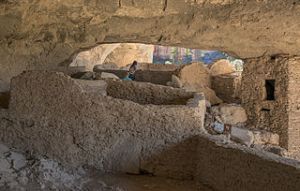
Gila Cliff Dwellings not far from my home – the caves have been used for thousands of years but the constructed rooms were only used from about 1276 to 1287 CE
Filed under: Poetry Tagged: archaeology, Cliff Dweller Canyon, Gila cliff dwelling, Gila River, haiku, Mogollon, Native Americans, US National Monument








April 9, 2016
Mars Odyssey 15th Birthday #NASA #science #space #Mars

Not what Odyssey found on Mars – those must be tattoos on the princess – no way they’d stay in place as she moves
Odyssey launched on April 7 fifteen years ago. It was NASA’s 2001 space odyssey, named for the classic scifi novel, and became the longest-lived Mars spacecraft in history. It still has fuel for several more years.
There was a lot we wanted Odyssey to accomplish: study geology and radiation, and hunt for water. Water is important to humanity’s future on Mars, and understanding the planet’s radiation environment is vital to keeping explorers and (maybe?) colonists alive. Geology may determine where the first human explorers touch down. Odyssey became a relay station for surface craft that followed it, so it’s part of many missions.
We know so much more about Mars than before Odyssey, even if there are

Scifi colonists may not survive on the real planet Mars
still plenty of mysteries. Mars has become a real place rather than a backdrop for fantasy and serious efforts are underway to send people to Mars – to explore, to learn, and perhaps to colonize. But not to rescue scantily clad princesses. Today we need black holes or warp drive to reach such space creatures.
Happy Birthday Odyssey.
Thanks to space.com
Filed under: Kate's Books, Neat Science News, Science Fiction Tagged: colonization, explore, mars, Martian geology, NASA, Odyssey, radiation, rovers, water on Mars








April 6, 2016
Surveillance #humanrights #tech
Eyes in the sky,
Eyes on the ground,
Eyes watch deserted streets
And where crowds are found.
What makes you safer?
What feels right?
Open to the internet,
Or restricted tight?
Watched through the night,
Watched dawn and noon.
You need protection
But protection from whom?
By Kate Rauner
Colonists in my On Mars series have an artificial intelligence – all their communications and data searches pass through it, and it watches using imagers throughout the colony. They mostly appreciate their AI – would you? More about my books here.
Thanks to slate.com for inspiration.
Filed under: Poetry Tagged: Big Brother government, public, spy, surveillance camera








April 2, 2016
More Fish More Food More Profit – good news for people and #nature #environment #innovation #usa

“Fish” includes creatures like this King Crab
Protecting the environment doesn’t have to mean sacrifice – at least, not in the world’s fisheries.
Fish populations are crashing in most of the world’s fisheries and it looks like remaining fishermen will fight each other to be the one who kills the last food-fish. That’s a sad dystonian view of the future.
Fish Up, Jobs Up, Money Up
A type of quota system called catch-share or fishing-rights is turning failing fisheries around. In Australia, Belize, Chile, Denmark, Namibia, the United States, and elsewhere, catch-share has accomplished something amazing.
In the U.S., since 2000, there has been a 70% drop in the number of overfished species. The number of fish with rebuilt populations has risen from zero to 39. At the same time, the number of jobs in fishing has risen by 31% in the past three years while revenue has risen 44%.
The total catch allowed is set by scientists using their latest data and each fisherman is allotted a percentage of that total. All fishermen have an incentive to use best practices and police their own waters. They advocate to protect spawning groups so there will be more fish, reduce wasteful “by-catch,” and police each other against cheating. It works when the quotas are rigorously and fairly enforced, so a country must have enough political will.
Enforcement was beautifully illustrated on the season premier of Deadliest Catch. As all the crab fishing boats waited for noon – the legal start of the season – a Coast Guard helicopter patrolled overhead. One captain made a mistake and dropped his first crab trap at 11 o’clock instead of 12 o’clock – realized his mistake, and radioed the Coast Guard to report himself. Self-reporting is a key element of the system – the Coast Guard told him to empty the trap and start over. Punish cheaters and reward those who play fair. It’s working – crab populations and quotas are up this year.
Catch-share turns the classic Tragedy of the Commons into triumph. It will take long-term discipline to support data collection year after year, and to fight the human desire to cheat. It’s a job that will never be done – but then, commercial fishing will never be done either – if we show enlightened self-interest.
Thanks to nationalgeographic.com
Filed under: Neat Science News Tagged: catch share, commercial fishing, environment, environmental issues, environmentalism, fish, fisheries, fishing rights, good news, jobs, science








March 30, 2016
Glory on #Mars excerpt Chapter One: Incident #amwriting #scifi #amreading #books
The seaside resort of Noordwijk was a strange place to train for a mission to the barren deserts of Mars, but Colony Mars had its tidy headquarters north of the Dutch city, inland from the deep dunes of the beach. Sightseers hurried through the visitors’ center to join guided tours of a Martian colony mockup and settler-candidates stopped between austere buildings to admire the summer flowers that replaced spring tulips.
 Emma was about to start her last English-language tour when her link beeped an incoming message – the tone for “urgent”. One family was still coming up the ramp, two young boys ricocheting among signs diagramming the mockup of the colony. Emma turned discreetly to one side and tapped her headset.
Emma was about to start her last English-language tour when her link beeped an incoming message – the tone for “urgent”. One family was still coming up the ramp, two young boys ricocheting among signs diagramming the mockup of the colony. Emma turned discreetly to one side and tapped her headset.
“There’s a mission problem.” Emma didn’t check her contact lens for metadata – that was the mission lead’s voice in her ear. “Come to the control room as soon as duties allow.”
A chill ran through Emma. Maybe her launch date had slipped. Maybe they’d miss the window entirely and she’d remain on Earth, temporarily reprieved. Why was that the first thought that came to her? Must be pre-launch jitters.
Emma was about to fly on Settler Mission Three and her journey depended on a narrow launch window. Balancing the planets’ orbital dance with fuel requirements, Colony Mars could launch a mission every twenty-six months. If they missed it, there’d be a twenty-six month delay. But Emma excelled at focusing on the task at hand, so she turned her attention back to her tour group.
“If we’re all ready? My name is Emma Winters and I’m a Martian settler. In twelve days, Colony Mars will launch me and three crewmates into orbit to board our transport ship. I’ll be your guide today through this replica of the Kamp Kans colony habitat or nederzetting, as our Dutch founders call it.”
“Wow,” one of the bouncy boys said. He was clearly a fan, dressed in a rugby shirt from the gift shop, striped in rusty red and sky blue just like Emma’s uniform. “Are you really going to Mars and never coming back?”
“Yup. This is my last day in Holland.”
She watched everyone’s eyes widen at that. Public outreach, like this tour, was part of every settler’s training, right up to their final day at headquarters. Personal contact kept public interest and donations high.
The urgent message tugged at her thoughts and she pushed it away again.
“Why don’t one of you young men open the door and we’ll begin.” She gestured towards the white metal hatchway. The younger boy hopped forward, stopping just before he ran into the door.
“Hey!”
“You have to open it manually, dummy,” his brother said. He looked back at Emma proudly. “All the nederzetting’s doors are manual.”
“That’s right,” Emma said with a practiced smile. The tour always started with the surprise of a manual door.
“Colony Mars uses the latest technology for some things, like construction, communications, and power generation. But technology requires lots of support – spare parts and maintenance. There are only eight people on Mars now; twelve when my mission gets there. Human beings are flexible – our hands can replace dozens of servomechanisms.”
The boy scowled at her skeptically.
Emma held up a pencil she carried especially for this bit.
“Even simple tools are complex to manufacture. The wood for this pencil is logged in Oregon, in America. The graphite in the center is mined in Sri Lanka. Zinc and copper from Africa for the cap, and the eraser combines Italian pumice with Canadian rapeseed oil.” She waggled the pencil at the crowd.
“I haven’t mentioned the machines needed to produce it, or the thousands of workers and piles of parts at every step. On Mars, we use low tech wherever we can.” Emma spun the wheel-shaped handle, and stepped to one side as she heaved the door open.
“Even ‘no tech’. These hinges will still be working a hundred years from now.”
She pushed the urgent message firmly out of her mind as the group stepped and stumbled over the door frame.
***
The quickest route to Mission Control was through the visitors’ center. From the lobby, tourists turned right to enter the museum and gift shop under a banner in four languages.
Mars is ons geschenk aan de toekomst
Marso estas nia donaco al la estonteco
Mars est notre cadeau pour l’avenir
Mars is our gift to the future
Instead, Emma stepped behind the lobby’s welcome desk. Rather than the 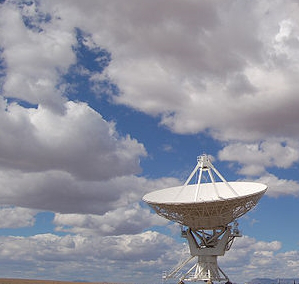 usual cheery greeting, the attendant nodded grimly. Alarmed, Emma laid her hand on the scanner, a door concealed in the wall clicked open, and she hopped on the walkalator to the Mars-Earth Exchange building.
usual cheery greeting, the attendant nodded grimly. Alarmed, Emma laid her hand on the scanner, a door concealed in the wall clicked open, and she hopped on the walkalator to the Mars-Earth Exchange building.
She could see the MEX antenna farm from the glass corridor. Today a group from the nearby European Space Agency’s Technology Center stood at the base of the main dish – their visit had been the day’s news at breakfast – but she was too distracted to wonder if they’d award another grant to Colony Mars.
She entered at the back of a stadium-style control room, behind two dozen stations, each arranged like an individual cockpit, and scanned the room for Filip Krast, the stocky MEX mission control lead. The front row, on the lowest level, was fully occupied as always by controllers running the satellite systems that orbited Mars – communications, tracking, weather, and solar power. On the second level technicians were installing upgrades for Emma’s Settler Three mission.
Filip hurried across the top level, past the special projects stations, and ushered Emma to a glass-walled cubicle against the back wall.
“There’s been a… an incident at Kamp. This isn’t easy to watch.” He steered her to a video console in the corner and hit playback. “There’s been a death.”
Emma sat up straight and felt her fingers go cold.
On the vid, the colony’s doctor, Ingra, was stepping through a door in the habitat module. The lights were dimmed and the audio feed was silent except for the hum of life support systems – it was pre-dawn at the settlement. She crossed to the airlock, slowly rotated the door handle, and hopped through.
Filip tapped the console, switching to the playback from inside the airlock. Ingra sealed the door and looked up at the imager.
“By the time this transmission reaches Earth, I’ll be gone. I can’t stay here any longer. There’s a huge old oak tree beyond that little crater. No one can see it, but I know it’s there. I’m going home. Forgive me.” She walked past the surface survival suits hanging on the wall and reached for the airlock control panel.
Emma felt a knot tighten in her stomach.
“She can’t get out without a suit, can she? The airlock pumps are slow; she’ll pass out before the pressure is low enough for her to open the outer door, right?”
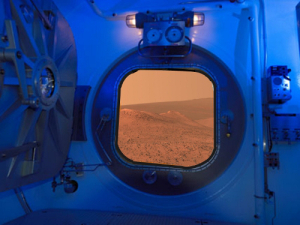 Filip pointed back to the screen.
Filip pointed back to the screen.
Ingra stepped to the outer door. With a pull and twist, she opened the emergency decompression valve. Red lights began to flash and ice fog clouded the imager lens. Ingra fumbled with the outer door and it opened. With her last lungful of air, she pulled the door open and disappeared into the darkness.
Glory on Mars is available here or see more options.
Filed under: Kate's Books, Science Fiction Tagged: Amazon, AppleiTunes, B&N, Barnes and Noble, best sci fi, can we go to Mars, colonization, colonize Mars, colony, free excerpt, kindle, mars, Sci Fi, science fiction, SciFi









